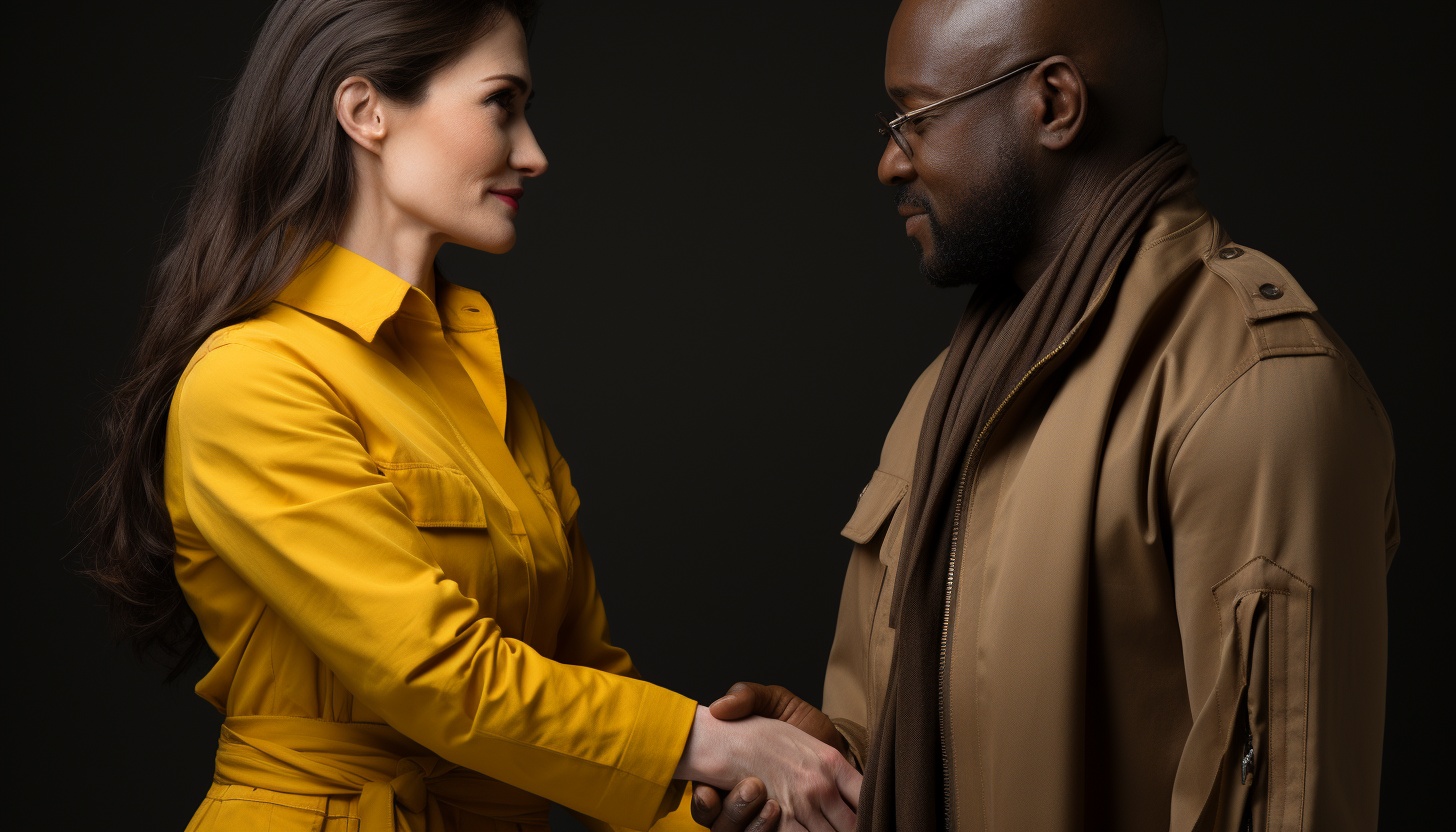
Trust-Building Exercises: Strengthening the Bond in a Relationship
Are you looking to strengthen the bond in your relationship? Discover the power of trust-building exercises.
In this article, we’ll show you practical, insightful, and empathetic ways to deepen the connection with your partner. From open and honest communication to active listening exercises, these techniques will help you foster emotional intimacy and create shared experiences.
Whether you’re starting anew or healing from a breach, trust-building exercises are the key to building a stronger, more fulfilling relationship.
Building Trust Through Open and Honest Communication

To build trust in your relationship, engage in open and honest communication. This is the foundation upon which a strong bond is built. When you communicate openly, you create an environment of trust and understanding, allowing both you and your partner to feel safe to express your thoughts, feelings, and concerns. Open communication means being willing to listen without judgment and to speak honestly without fear of backlash or rejection. It requires vulnerability and a willingness to be transparent with each other.
Honesty is the key to sustaining trust in any relationship. Be truthful in your words and actions, even when it’s difficult. Avoid hiding information or withholding important details. Remember, trust can easily be broken by deceit or lies. By being open and honest, you show your partner that you value their feelings and opinions, and that their trust is important to you.
It’s also crucial to practice active listening. When your partner is sharing something with you, give them your full attention. Show empathy and validate their feelings. Avoid interrupting or dismissing their emotions. This will help foster a deeper connection and understanding between you both.
Strengthening Trust With Active Listening Exercises

Engage in active listening exercises to strengthen trust in your relationship. Active listening is a powerful tool that allows you to truly understand and empathize with your partner’s thoughts, feelings, and experiences. By actively engaging in the conversation and demonstrating genuine interest, you are showing your partner that you value their perspective and opinions. This fosters an environment of trust and openness, where both partners feel heard and validated.
To help you practice active listening, here is a simple exercise you can try with your partner:
| Step 1: Choose a topic | Step 2: Take turns | Step 3: Reflect and respond |
|---|---|---|
| Select a topic that is important to both of you. It could be something like future goals, dreams, or challenges you are facing. | Take turns being the speaker and the listener. The speaker shares their thoughts and feelings on the chosen topic while the listener actively listens without interrupting. | After the speaker has finished sharing, the listener reflects on what they heard and responds with empathy and understanding. This allows the speaker to feel truly heard and validated. |
By engaging in this exercise regularly, you can strengthen the trust in your relationship and deepen your emotional connection.
Now, let’s move on to the next section where we will explore trust-building exercises for fostering emotional intimacy.
Trust-Building Exercises for Fostering Emotional Intimacy

To foster emotional intimacy in your relationship, try incorporating trust-building exercises that deepen your connection with your partner. Emotional intimacy is crucial for maintaining a strong and fulfilling relationship. It allows you to feel safe, vulnerable, and deeply connected to your partner.
By engaging in trust-building exercises, you can strengthen this emotional bond and create a solid foundation for your relationship.
One powerful exercise is the ’emotional check-in.’ Set aside dedicated time to sit down with your partner and ask each other how you’re feeling emotionally. This exercise encourages open and honest communication, allowing you to share your thoughts, fears, and vulnerabilities with one another. It fosters a sense of trust and understanding, as you both feel heard and supported.
Another exercise that promotes emotional intimacy is practicing gratitude together. Take turns expressing appreciation for each other and your relationship. This exercise cultivates a positive and loving environment, reinforcing your bond and reminding you of the qualities that you value in one another.
Lastly, engage in active listening exercises. Practice truly listening to your partner without interruption or judgment. This exercise helps you understand each other better, builds empathy, and creates a safe space for sharing thoughts and feelings.
Incorporating these trust-building exercises into your relationship will help foster emotional intimacy and strengthen your connection. Remember, building trust takes time and effort, but the rewards are immeasurable.

One way to cultivate trust in your relationship is by regularly embarking on shared experiences and adventures together. By actively participating in various activities with your partner, you can create lasting memories and deepen your bond.
Here are three reasons why shared experiences and adventures can help cultivate trust:
1. Building Communication: Engaging in new experiences requires effective communication and teamwork. Whether it’s trying out a new hobby or going on an adventurous trip, you’ll need to communicate openly and honestly with your partner. This shared communication fosters trust and understanding, as you learn to rely on each other and navigate unfamiliar situations together.
2. Creating Shared Memories: Shared experiences and adventures create special moments and memories that are unique to your relationship. These memories become a foundation of trust, as you both look back on the times you faced challenges, celebrated achievements, and grew closer. The shared memories serve as a reminder of the trust and connection you have built over time.
3. Promoting Vulnerability: Trying new experiences often requires stepping out of your comfort zone, which can lead to vulnerability. Sharing these vulnerable moments with your partner allows for deeper emotional connection and trust. By supporting each other through these experiences, you show that you’re reliable, trustworthy, and willing to be there for one another.
Rebuilding Trust After a Breach: Exercises for Healing and Forgiveness

To rebuild trust after a breach, you need to actively participate in exercises for healing and forgiveness. It can be a challenging process, but with dedication and commitment, it is possible to restore the bond in your relationship. Here are some exercises that can help you on this journey of rebuilding trust:
| Exercise | Description |
| Communication and Active Listening | Take the time to openly and honestly communicate with each other. Listen actively, without interrupting or passing judgment. Validate each other’s feelings and experiences. This exercise allows you to understand each other’s perspectives and rebuild the foundation of trust through effective communication. |
| Transparency and Accountability | Be open and transparent about your actions and decisions. Share your thoughts, feelings, and intentions with your partner. Establish clear boundaries and expectations. Take responsibility for your mistakes and show genuine remorse. Being accountable for your actions helps rebuild trust as it demonstrates your commitment to change and grow. |
| Patience and Forgiveness | Rebuilding trust takes time and patience. Practice forgiveness towards yourself and your partner. Let go of resentment and focus on the present moment. Understand that healing is a gradual process, and it requires both parties to show compassion and understanding. Be patient with each other and allow space for growth and healing. |
| Building Emotional Intimacy | Engage in activities that promote emotional intimacy. Spend quality time together, engage in deep conversations, and express empathy and support for each other. By building emotional intimacy, you create a safe space for vulnerability and connection, which is vital for rebuilding trust. |
| Seeking Professional Help | If the breach of trust has caused significant damage, seeking professional help can be beneficial. A therapist or counselor can provide guidance and support as you navigate through the healing process. They can help you explore the underlying issues, develop effective communication strategies, and provide tools to rebuild trust. Professional help can provide an objective perspective and facilitate a healthy and constructive environment for healing and forgiveness. |
Conclusion
In conclusion, trust-building exercises are essential for strengthening the bond in a relationship. By fostering open and honest communication, practicing active listening, cultivating emotional intimacy, and sharing experiences together, couples can deepen their trust and connection.
Additionally, when trust is broken, exercises focused on healing and forgiveness can help rebuild what was lost. Remember, trust takes time and effort to build, but with dedication and these exercises, you can create a strong foundation for a healthy and thriving relationship.






